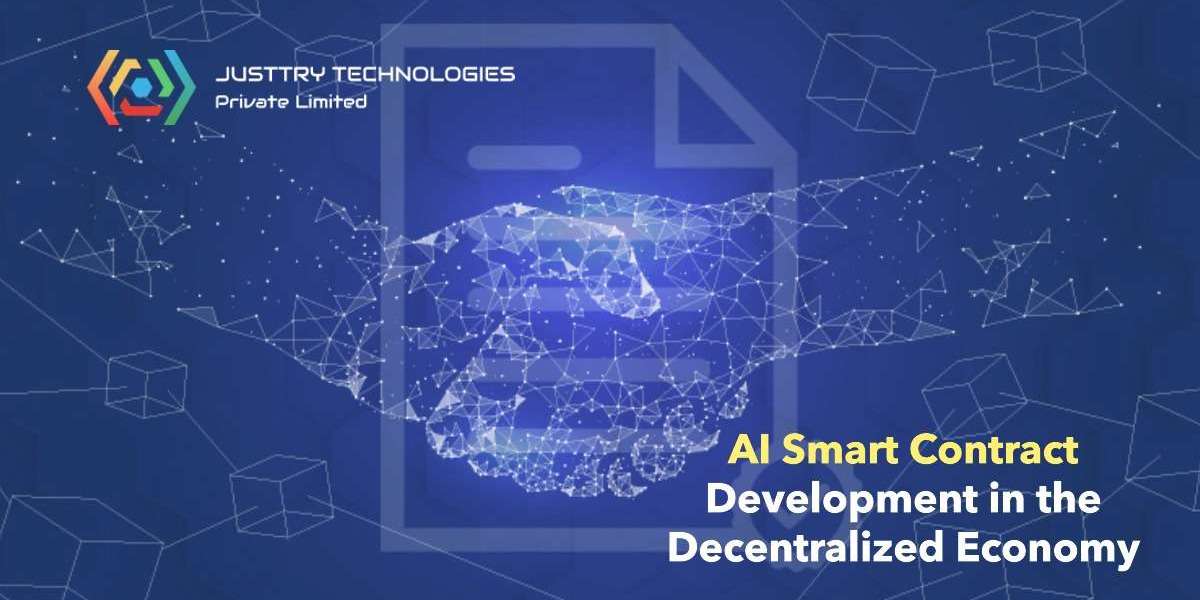Introduction
Decentralization is no longer a speculative concept; it has emerged as the bedrock of a new economic paradigm. Driven by distributed technologies and a growing desire to move beyond centralized control, the decentralized economy is reshaping how we interact, transact, and build trust. At the heart of this shift lies an even more profound evolution: the integration of artificial intelligence into smart contract systems.
AI-powered smart contracts aren’t just programmed; they’re predictive, adaptive, and continuously evolving. These intelligent contracts introduce the next phase of automation in decentralized ecosystems, where execution is not only trustless but contextually aware and dynamically optimized.
How does the Decentralized Economy work
The decentralized economy operates on the foundational principle of eliminating intermediaries. Unlike traditional systems dependent on centralized authorities, banks, corporations, or governments, the decentralized model is peer-to-peer, transparent, and governed by code. Its pillars include:
- Blockchain technology for immutable record-keeping
- Tokenized incentives to align stakeholders
- Distributed ledgers that remove the need for central oversight
- Community governance through DAOs (Decentralized Autonomous Organizations)
In this framework, control is democratized. Users become stakeholders. Trust is rooted in cryptographic truth rather than institutional promises.
What is AI Smart Contract development?
Smart contracts, in their basic form, are self-executing pieces of code that automate agreements when certain conditions are met. Traditionally, they are deterministic, with outcomes rigidly defined by hardcoded rules. However, such inflexible logic can falter in complex, unpredictable scenarios.
Enter AI-powered smart contracts, an evolved species of contract that incorporates:
- Machine learning algorithms
- Natural language processing
- Predictive analytics
- Real-time data interpretation
These contracts can analyze and respond to nuanced data inputs, adapt to changing environments, and make decisions based on historical patterns. The result is a contract that doesn’t just execute but evolves intelligently over time.
The Intersection of AI and Web3 Smart Contracts
Web3 smart contracts operate on decentralized platforms such as Ethereum, enabling decentralized applications (dApps) that are censorship-resistant and borderless. When enhanced with AI, these contracts become semi-autonomous agents capable of:
- Self-optimization – adjusting parameters for maximum efficiency or performance
- Semantic understanding – interpreting the intent behind certain inputs
- Adaptive risk management – changing behaviors based on new threat vectors or market fluctuations
This convergence creates a powerful synergy where smart contract logic is no longer static but enriched by real-time intelligence and learning capabilities.
Benefits of the Smart Contract in a Decentralized Economy
AI-enhanced smart contracts bring unique advantages that are especially critical for the decentralized world:
- Autonomous Governance: AI enables contracts to execute governance decisions, handle disputes, or reallocate resources without human oversight.
- Operational Agility: Businesses benefit from contracts that can adapt to real-world changes like volatile pricing, new regulations, or fluctuating demand.
- Data-Driven Execution: Decisions are powered by data, not assumptions, leading to more informed and equitable outcomes.
- Predictive Compliance: Contracts can foresee regulatory triggers and proactively adjust terms to remain compliant.
These capabilities make AI smart contracts indispensable for scalable, responsive, and intelligent decentralized ecosystems.
Key Use Cases Across Industries
AI smart contracts are already proving transformative in multiple sectors:
- DeFi (Decentralized Finance): Adaptive interest rates, algorithmic trading, and smart credit scoring models.
- Real Estate: Automated due diligence, dynamic escrow agreements, and AI-led title verification.
- Insurance: Smart policies that adjust premiums based on risk profiles or initiate claims processing after sensor-based event verification.
- Supply Chain and Logistics: Contracts that recalibrate delivery terms based on real-time inventory, weather, or geopolitical disruptions.
These applications underscore the far-reaching potential of AI in building responsive, intelligent business ecosystems on decentralized rails.
How Smart Contract Development Services Are Evolving
To address these complexities, smart contract development services are undergoing a profound transformation. No longer confined to simple scriptwriting, development firms are now creating full-stack blockchain solutions that incorporate AI seamlessly.
These services often include:
- Custom Solidity development integrated with AI APIs
- Deployment on interoperable Web3 ecosystems
- On-chain and off-chain AI orchestration
- Continuous auditing and optimization
A forward-thinking Solidity development company doesn't just build for today; it anticipates the adaptive needs of tomorrow's decentralized economy.
Why partner with Justtry Technologies
At the forefront of this transformation is Justtry Technologies, a leading smart contract development company that specializes in AI-augmented Web3 solutions. Our approach is rooted in modular architecture and deep learning integrations that empower businesses to build intelligent dApps with long-term adaptability.
Their key strengths include:
- AI-driven protocol customization
- Real-time contract analytics
- Future-proof security frameworks
- Tailored development across DeFi, NFT, and enterprise sectors
By combining smart contract technology with advanced AI capabilities, Justtry Technologies delivers systems that not only execute but also think, learn, and evolve.
Conclusion
The fusion of AI and blockchain is more than a technological convergence; it represents a philosophical shift toward systems that are not only decentralized but also self-aware. As the decentralized economy matures, AI smart contracts will become its operational brain, continuously learning from data and responding in real-time.
In this intelligent, adaptive future, one question remains: are our businesses prepared to embrace contracts that evolve with every interaction?



